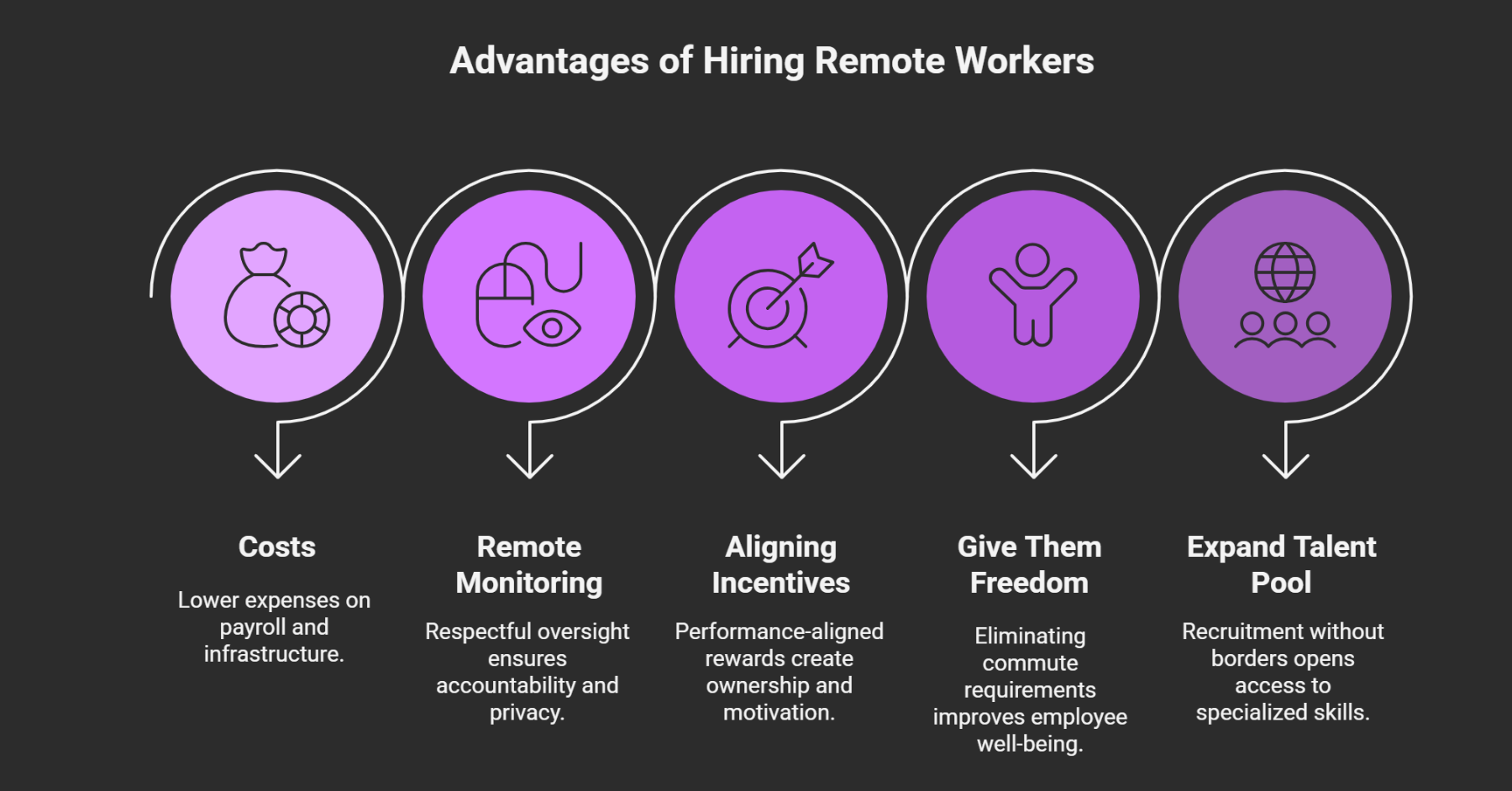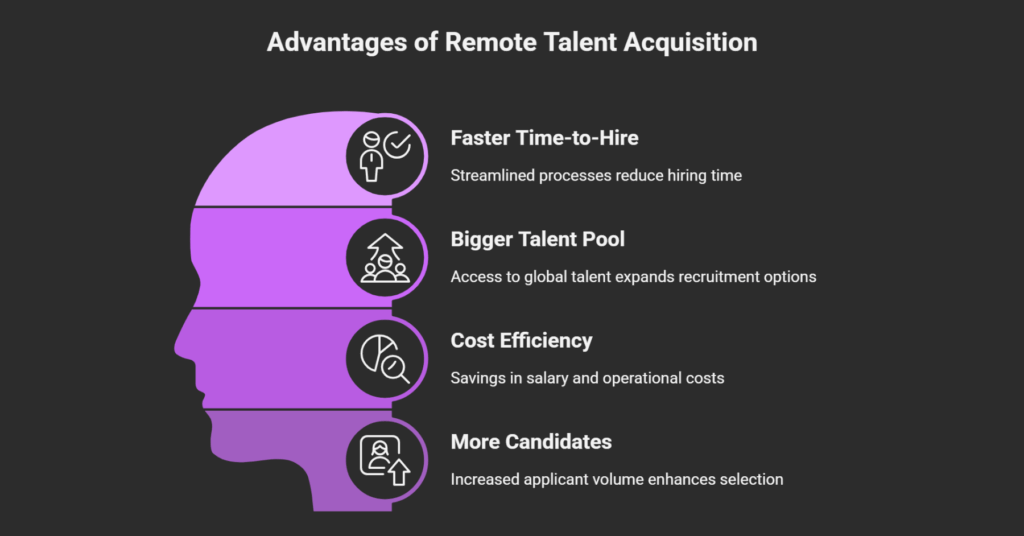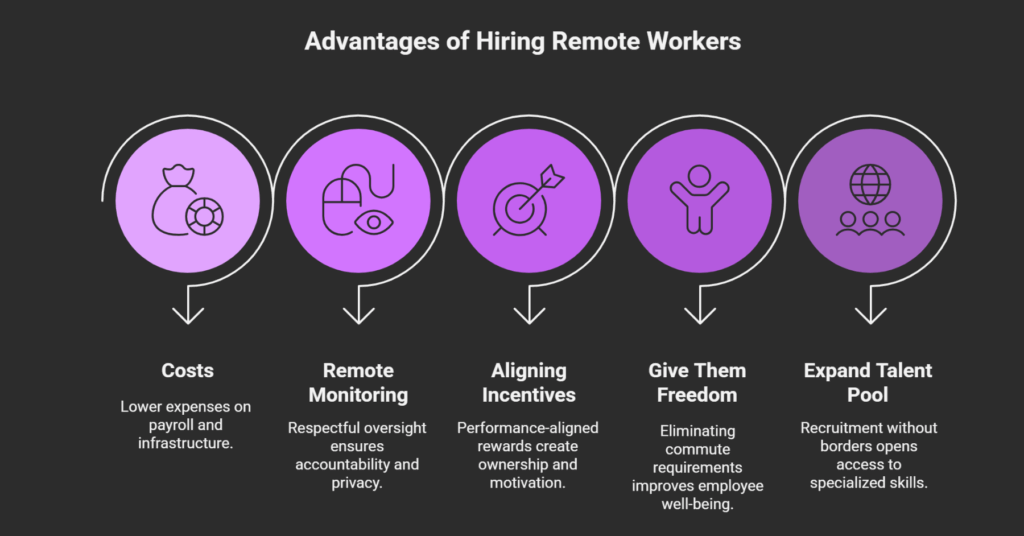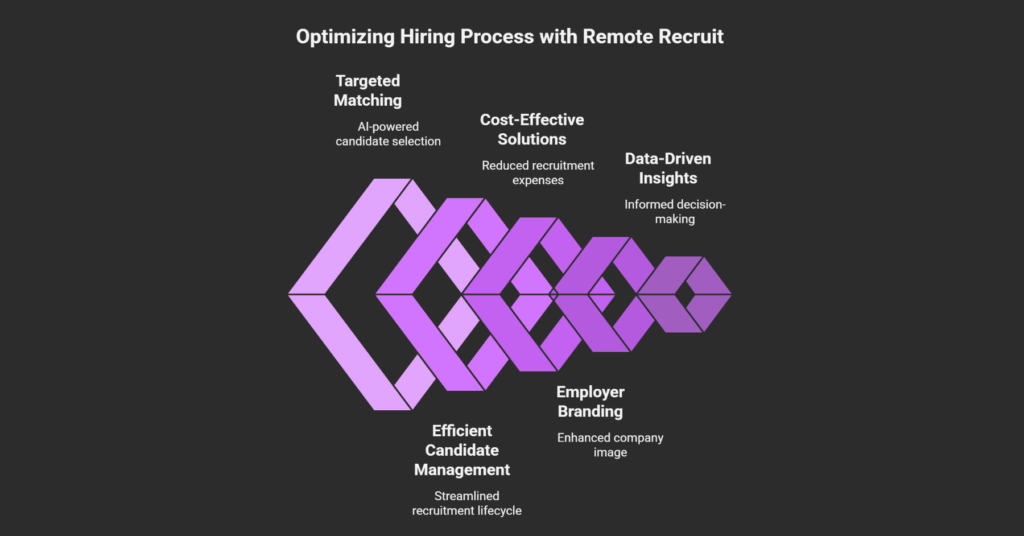Hire Remote Workers with Remote Recruit to cut hiring overhead, unlock global talent and build a high-performance distributed team
Remote hiring is no longer just a perk—it is a strategic advantage that drives growth and efficiency. As traditional in-office models inflate costs and limit access to talent, companies are discovering the power of distributed teams. By shifting headcount from high-cost local hires to remote professionals, organizations save on office leases, commute stipends and salary bands. Modern monitoring tools maintain accountability without intrusive supervision. Performance-based incentives replace micromanagement and empower teams to own their results. Granting true autonomy boosts productivity and employee satisfaction. Finally, expanding recruitment beyond geographic constraints unlocks an unparalleled talent pool across time zones and cost-of-living brackets.
This article explores the remote revolution, illustrates concrete cost savings, details respectful monitoring practices, outlines incentive-driven management, champions work-life freedom and highlights how to win global talent. Embrace these insights to transform your workforce and achieve sustained competitive advantage.
Introduction: The Remote Revolution
The traditional requirement to work onsite every day is rapidly losing its appeal for both employers and employees. Advances in digital collaboration have rendered office presence optional, allowing teams to engage seamlessly from anywhere. Rising real estate costs, lengthy commutes and localized talent shortages are pushing companies to rethink their staffing models. Remote hiring enables businesses to operate with leaner overhead, reduce carbon footprints and tap into a worldwide talent pool. Employees gain flexibility, improved work-life balance and increased autonomy, leading to higher retention and engagement. By adopting remote work strategically, organizations can future-proof their operations, increase resilience and unlock growth opportunities in an ever-evolving marketplace.
Key Advantages of Hiring Remote Workers:
1. Costs
Lowering payroll and infrastructure expenses is one of the most immediate benefits of remote hiring.
-
Office leases, commute stipends and U.S. salary bands versus remote savings
Maintaining physical office space imposes significant fixed costs including rent, utilities, maintenance and equipment. Employers often offer commute stipends or transportation allowances that further increase overhead. In the United States, salary expectations for in-office positions tend to be higher due to cost-of-living pressures in major metropolitan areas. By contrast, remote roles can be filled with professionals located in lower-cost regions while still delivering high-quality work. This strategic geographic flexibility translates into substantial annual savings that can be reinvested in growth initiatives. -
Hire in lower-cost geographies within the U.S. or abroad
Remote recruiting allows companies to target states or countries where living expenses and salary expectations are lower. Skilled professionals in smaller U.S. cities or international hubs can offer equivalent expertise at a fraction of the cost. This approach diversifies your team’s perspectives and skill sets while optimizing budget allocation. Legal and compliance frameworks can be managed through global employment partners, ensuring adherence to local regulations. As a result, organizations maintain competitive compensation packages and access niche talent without breaking the bank.
2. Remote Monitoring
Respectful oversight ensures accountability without eroding trust or privacy.
-
Screen-capture, time-tracking and productivity dashboards that respect privacy
Modern remote monitoring tools capture screenshots or app usage data at scheduled intervals rather than continuous surveillance. This balances transparency with respect for employee privacy and autonomy. Time-tracking software records active work sessions and helps identify workflow bottlenecks. Productivity dashboards aggregate key performance indicators such as tasks completed and project milestones met. Managers can use these insights for data-driven coaching while remote workers retain flexibility over their schedules and environments.
3. Aligning Incentives
Performance-aligned rewards create ownership and motivation, replacing outdated supervision models.
-
Bonus structures that replace micromanagers and foster ownership
Rather than tracking every activity, successful remote teams tie compensation to measurable outcomes such as completed projects, sales targets or customer satisfaction scores. Bonus and commission schemes incentivize individuals to exceed goals and innovate. Transparent metrics dashboards allow employees to monitor their own performance and adjust strategies in real time. This autonomy empowers self-management and instills a sense of ownership over results. As a result, managers shift from micromanaging tasks to strategic coaching that accelerates team development.
4. Give Them Freedom
Eliminating commute requirements and rigid schedules dramatically improves employee well-being and focus.
-
Eliminating commutes, boosting work-life balance and productivity
Long daily commutes increase stress, reduce time for personal responsibilities and contribute to burnout. Allowing remote work liberates employees from these burdens and grants control over their work environment. Flexible scheduling enables team members to align tasks with their peak productivity hours, whether early morning or late evening. This flexibility often leads to higher output, greater creativity and reduced absenteeism. By trusting employees to manage their time, companies foster healthier, more engaged and more loyal teams.
5. Expand the Talent Pool
Recruitment without borders opens access to specialized skills and fosters diverse perspectives.
-
Access to candidates in every time zone and cost-of-living bracket
Global hiring removes geographic constraints on talent searches, enabling businesses to find the exact skill sets they need. Distributed teams can cover extended service hours or even operate around the clock, improving customer support and project velocity. Diversity in backgrounds and experiences sparks innovation and drives better problem-solving. Cultural intelligence and cross-regional collaboration become competitive advantages. With the right infrastructure and communication protocols, global teams function as seamlessly as local ones, delivering superior results.
Solutions Provided by Remote Recruit
Remote Recruit offers tailored solutions for both employers and job seekers to thrive in the remote economy. Employers gain access to an extensive network of pre-vetted remote professionals across industries and regions. Our end-to-end recruitment platform streamlines candidate sourcing, screening and onboarding, reducing time-to-hire and ensuring compliance with local employment regulations. Built-in collaboration tools enable real-time communication, file sharing and performance tracking, fostering seamless integration of remote hires into existing teams.
For job seekers, Remote Recruit provides a personalized job matching service that aligns individual skills, career goals and preferred work styles with top remote opportunities. Our coaching resources cover resume optimization, interview preparation and remote work best practices to accelerate success. Both employers and candidates benefit from continuous support, feedback loops and community forums that promote best-in-class remote work strategies. With Remote Recruit, organizations and professionals unlock the full potential of remote employment.
Remote work represents a powerful win-win model for modern businesses and talent alike. By reducing overhead costs, respecting employee autonomy and leveraging global skills, companies can build resilient, high-performing teams that drive growth. Thoughtful remote monitoring, incentive alignment and flexible scheduling maintain accountability while promoting engagement and well-being. Expanding recruitment beyond borders taps diverse perspectives that fuel innovation. As technology and collaboration tools continue to evolve, remote work will remain a cornerstone of competitive advantage. Organizations that embrace these principles position themselves to attract top talent, adapt to changing market demands and achieve sustainable success.
Ready to build your remote workforce and unlock global talent Sign up with Remote Recruit today.




